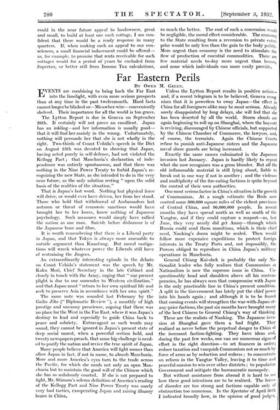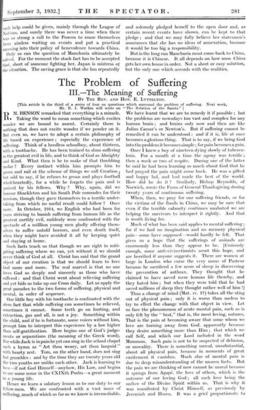Far East em Perils
BY OWEN M. GREEN.
FVENTS are combining to bring back the Far East I into the limelight, with even more serious prospects than at any time in the past twelvemonth. Hard facts cannot longer be blinked or—Micawber-wise—conveniently shelved. Their importance for all the world is too grave.
The Lytton Report is due in Geneva on September 26th. It certainly will not prove an emollient. Japan has an inkling—and her information is usually good— that it will find her mainly in the wrong. Unfortunately, nothing will persuade her that she is not wholly in the right. Two-thirds of Count Uchida's speech in the Diet on August 25th was devoted to showing that Japan, having acted purely in self-defence, had not violated the Kellogg Pact ; that Manchuria's declaration of inde- pendence was entirely spontaneous, and that there was nothing in the Nine Power Treaty to forbid Japan's re- cognizing the new State, as she intended to do in the very near future, as the only solution resting " upon the solid basis of the realities of the situation."
That is Japan's last word. Nothing but physical force will drive, or would ever have driven, her from her stand. Those who hold that withdrawal of Ambassadors last autumn or threat of economic sanctions would have brought her to her knees, know nothing of Japanese psychology. Such measures would simply have rallied the nation as one man. Suicide before dishonour is of the Japanese bone and fibre.
It is worth remembering that there is a Liberal party in Japan, and that Tokyo is always more amenable to outside argument than Kuantung. But moral castiga- tions will wreck whatever power the Liberals still have of restraining the Jingoes.
An extraordinarily interesting episode in the debate on Count Uchida's statement was the speech by Mr. Kaku Mori, Chief Secretary in the late Cabinet and closely in touch with the Army, urging that " our present plight is due to our surrender to Western civilization," and that Japan must " return to her own spiritual life and seek to preserve Asia in accordance with her own spirit."
The same note was sounded last February by the Gaiko Jiho (" Diplomatic Review "), a monthly of high prestige and uncanny prescience, arguing that there was no place for the West in the Far East, where it was Japan's destiny to lead and especially to guide China back to peace and sobriety. Extravagant as such words may sound, they cannot be ignored in Japan's present state of deep social unrest, when a powerful section hold, and twenty newspapers preach, that some big challenge is need- ed to purify the nation and revive the true spirit of Japan.
Many people believe that America will fight sooner than allow Japan in fact, if not in name, to absorb Manchuria. More and more America's eyes turn to the trade across the Pacific, for which she needs not only an open Man- churia but to maintain the good will of the Chinese which she has so sedulously courted. If she is not prepared to fight, Mr. Stimson's solemn definition of America's reading of the Kellogg Pact and Nine Power Treaty was surely very bad tactics, exasperating Japan and raising illusory hopes in China, Unless the Lytton Report results in positive action-- and, if a recent telegram is to be believed, Geneva me% nizes that it is powerless to sway Japan—the effect in China for all foreigners alike may be most serious. Already sorely disappointed by long delays, she will feel that she has been deserted by all the world. Storm clouds are again beginning to roll up on Shanghai, where the boycott is reviving, discouraged by Chinese officials, but supported by the Chinese Chamber of Commerce, the lawyers, and, of course, the terrorists. Again the Chinese Courts refuse to punish anti-Japanese rioters and the Japanese naval shore guards are being increased.
Exactly the same causes culminated in the Japanese invasion last January. Japan is hardly likely to repeat what she now recognizes was a gross blunder. But all the old inflammable material is still lying about, liable to break out in one way if not in another ; and the violence and multiplicity of the fire-eating factions is quite beyond the control of their own authorities.
One most serious factor in China's situation is the growth of Communism. At a rough estimate the Reds now control some 300,000 square miles of the richest provinces of Central China, and 90,000,000 people. In recent months they have spread north as well as south of the Yangtze, and if they could capture a seaport—as, last June, they very nearly did get Amoy—through which Russia could send them munitions, which is their chief need, Nanking's doom might be sealed. Then would follow more expensive expeditions to protect foreign interests in the Treaty Ports and, not impossibly, the Powers obliged to reproduce in China Japan's military operations in Manchuria.
General Chiang Kai-shek is probably the only Na- tionalist leader who fully realizes that Communism or Nationalism is now the supreme issue in China. Un- questionably head and shoulders above all his contem- poraries, he has always seen that compromise with Japan is the only practicable line in China's present condition. A split in the Government has lately put the chief power into his hands again ; and although it is to be feared that coming events will strengthen the war-with-Japan-at- any-price factions, the past six months have brought many of the best Chinese to General Chiang's way of thinking.
These are the realists of Nanking. The Japanese inva- sion at Shanghai gave them a bad fright. They realized as never before the perpetual danger to China of the incessant faction-fighting. They have ideas and, during the past few weeks, one can see numerous signs of effort in the right direction—to set finances in order; reduce taxation and vanquish Communism not so much by force of arms as by seduction and redress ; to concentrate on reform in the Yangtze Valley, leaving it to time and peaceful suasion to win over other districts ; to popularize Government and mitigate the bureaucratic monopoly.
But without assistance from abroad it is hard to see how these good intentions are to be realized. The forces of disorder are too strong and factions capable only of obstruction too numerous. In the Spectator of April 30th I indicated broadly how, in the opinion of good judges, such help could be given, mainly through the League of Nations, and surely there was never a time when there was so strong a call to the Powers to rouse themselves from aimless waiting on events and put a practical meaning into their policy of benevolence towards China.
Only so can the question of Manchuria ultimately be solved. For the moment the stark fact has to be accepted that, short of someone fighting her, Japan is mistress of the situation. The saving grace is that she has repeatedly and solemnly pledged herself to the open door and, as certain recent events have shown, can be kept to that pledge ; and that we may fully believe her statesmen's assurances that she has no ideas of annexation, because it would be too big a responsibility.
But in the long run Manchuria must come back to China, because it is Chinese. It all depends on how soon China gets her own house in order. Not a short or easy solution, but the only one which accords with the realities.































 Previous page
Previous page